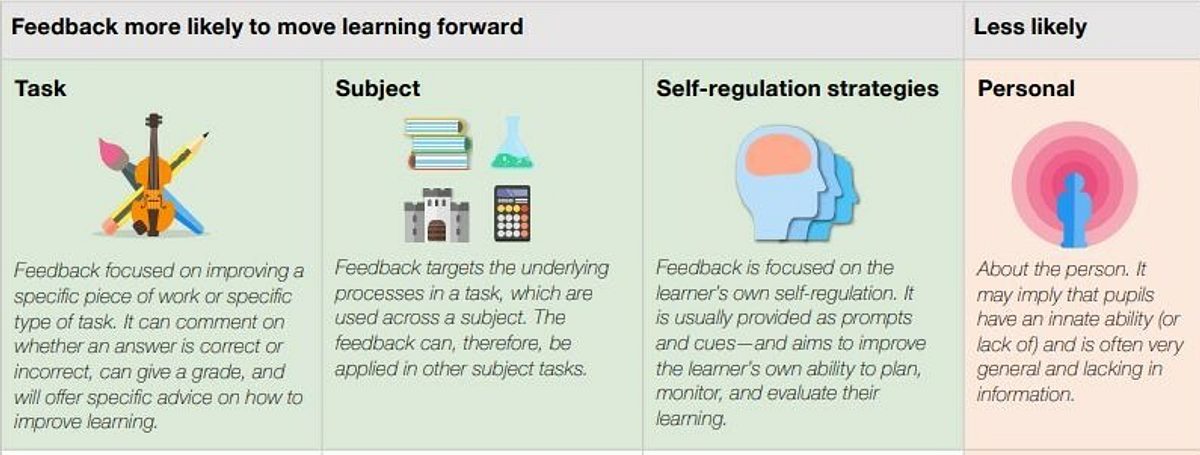
Blog -
Learning Behaviours
Behaviour is often thought of as something negative that gets in the way of learning.

Share on:

by Derby Research School
on the
Today the Education Endowment Foundation (EEF) has published its latest guidance report. This new Teacher Feedback to Improve Pupil Learning guidance reviews the best available research to offer schools and teachers six recommendations to support teachers in delivering feedback effectively.
All teachers understand the importance of providing meaningful feedback. Done well, it supports pupil progress, building learning, addressing misunderstandings, and thereby closing the gap between where a pupil is and where the teacher wants them to be.
This process is a crucial component of high-quality teaching and can be seen in classrooms across all phases and subjects. However, not all feedback has positive effects. Done badly, feedback can even harm progress. Nor is feedback ‘free’. Large amounts of time are spent providing pupils with feedback, perhaps not always productively.

Rather than thinking about feedback as an isolated event, this report makes it clear that feedback is likely to be more effective if it is approached systemically, and specifically, by adopting three fundamental principles: careful groundwork before the feedback is given, providing well-timed information that focuses on improvement, and also taking into account how learners receive and use that information.
This guidance report aims to move beyond this ‘see-saw’ and focus on what really matters: the principles of good feedback rather than the written or verbal methods of feedback delivery.
We’re going to give a brief overview of the first three recommendations which focus on principles that underpin successful feedback, such as it being based on strong foundations and ensuring that it is designed to move learning forward.

As John Hattie and Helen Timperley noted in their review of feedback, by its very definition, ‘Feedback can only build on something; it is of little use when there is no initial learning or surface information. Feedback is what happens second’ (2007).
The first task of the teacher, before feedback is delivered, is to provide effective instruction. Feedback alone is unlikely to provide pupils with a full understanding of the knowledge, skills, and concepts required and so initial teaching is crucial. Without it, feedback may be left with too much work to do.
Of course, the characteristics of effective instruction vary by phase and subject; these are discussed in several subject and phase-specific EEF guidance reports

Once effective initial instruction has been delivered and following the establishment of the learning intention and formative assessment of pupils’ understanding teachers should then provide appropriately timed feedback, which focuses specifically on the task, subject, and/or pupils’ self-regulation strategies. This recommendation draws from the review of evidence that informs this guidance, alongside previous reviews, feedback theory, reflections from practice, and our expert panel, to offer broad principles on when to provide feedback and what to focus on.
Compared to the timing of feedback, the evidence on what to focus feedback on may offer a clearer message. Feedback should focus on moving learning forward, targeting the specific learning gap identified by the teacher, and ensuring that a pupil improves. Specifically, high quality feedback can focus on the task (its outcome and advice on how to improve when doing that specific type of task), the subject (and the underlying processes within that subject), and self-regulation strategies (how pupils plan, monitor, and evaluate their work).

In addition to delivering high-quality initial instruction (including formative assessment), carefully judging the appropriate timing, and crafting the most impactful content, when providing effective feedback teachers also need to pay close attention to how pupils receive feedback and what they do with it after. As Stiggins, Arter, Chappuis and Chappuis remark, the most important decisions taken in classrooms are not taken by teachers but rather by learners.
Factors that may influence a pupil’s use of feedback include:
• Pupil motivation and desire for feedback
• Self-confidence and self-concept
• Trust in the teacher
• Working memory
A variety of pupil-level factors, such as pupil motivation, self-confidence, trust in the teacher, and capacity to manage information, are all likely to impact the effectiveness of the feedback provided. Moreover, careful planning is required to provide time and opportunities for pupils to use the feedback given.
“Formative feedback might be likened to “a good murder” in that effective and useful feedback depends on three things: (a) motive (the student needs it), (b) opportunity (the student receives it in time to use it), and (c) means (the student is able and willing to use it).”
Reflecting on the first three recommendations
Recommendations 1, 2, and 3 explain what effective feedback practice is likely to look like. They provide the core principles that should inform a teacher’s feedback to pupils and following them is more important than using a particular method of feedback delivery (such as written or verbal).
The following recommendations 4- 6 focus on methods of feedback and implementation of feedback.
The guidance is aimed at class teachers who provide feedback to pupils, as well as senior leaders who devise and implement school feedback policies. It targets all subjects, providing principles to suit all, along with examples to demonstrate feedback provision in particular subject and phase contexts. Additional audiences who may find the guidance relevant include governors, parents, programme developers, policy makers and education researchers.
Download the full report here- Download Here

Blog -
Behaviour is often thought of as something negative that gets in the way of learning.

In the news -
Take a read of our March 2024 newsletter…

Blog -
A Case Study of a School’s Approach to Developing Social and Emotional Learning Through Zones of Regulation.
This website collects a number of cookies from its users for improving your overall experience of the site.Read more